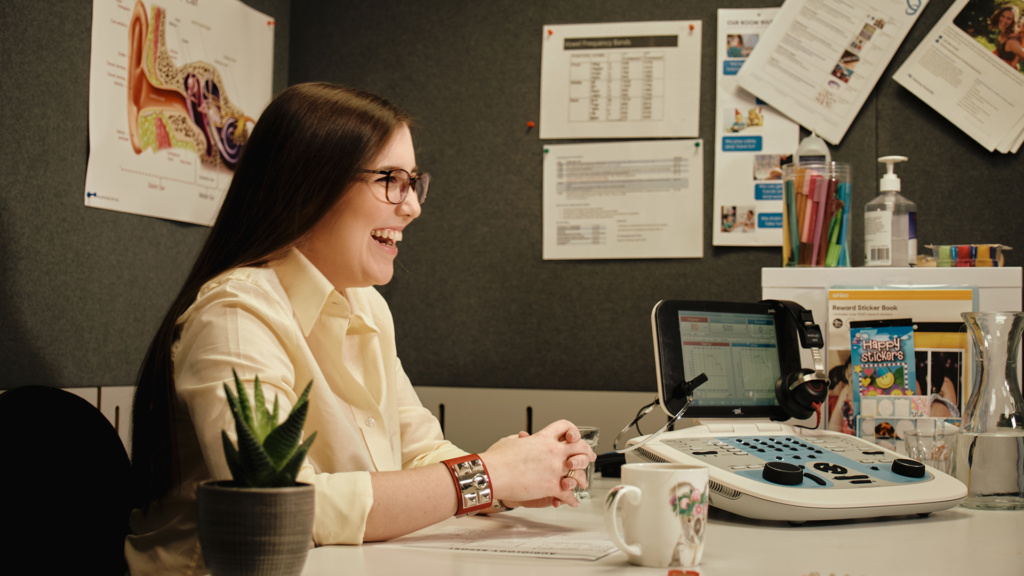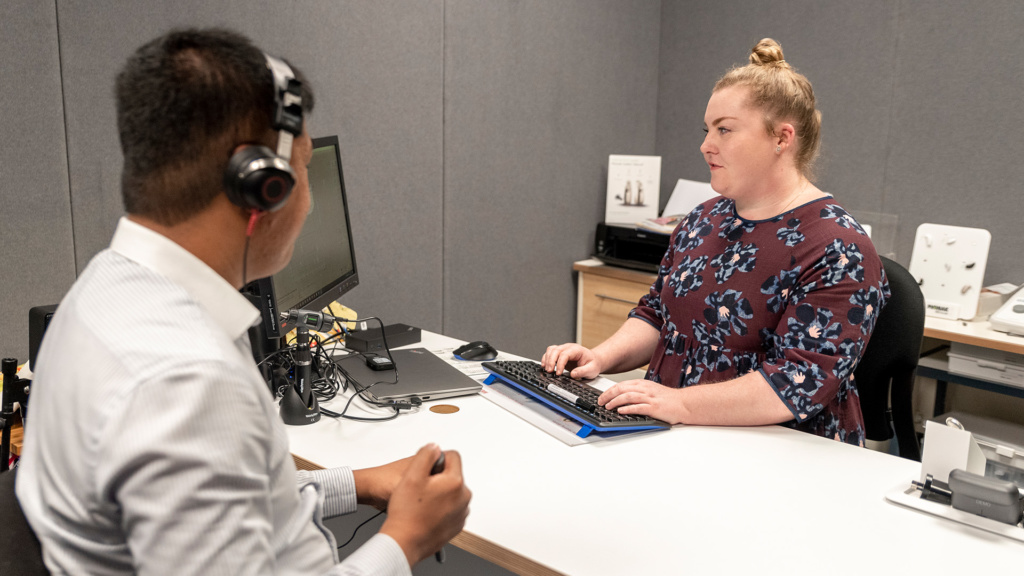“My tinnitus has pretty much gone, and my mood and crankiness has faded as I’m no longer struggling to hear people over the constant ringing in my ears.”
We are currently experiencing internet and phone issues in some of our centres. For all enquiries, please contact mail@hearandsay.com.au.
Tinnitus
About one in every three Australians suffers from tinnitus at some stage in their life1
Symptoms of tinnitus
Tinnitus is one of the most common – and frustrating – ear health issues. Tinnitus may sound like ringing, whistling, humming or hissing in your ears or in your head where no external noise is present. For some people, tinnitus doesn’t go away, and can affect sleep, daily activities and quality of life.

Most common sounds associated with tinnitus
- ringing
- buzzing
- whistling
- roaring
- humming.
What causes tinnitus?
There are lots of reasons why you might experience tinnitus. Tinnitus and hearing loss often go hand in hand, but hearing loss isn’t always the cause behind tinnitus. Other causes of tinnitus include:
- changes in medication
- fatigue
- stress or trauma
- illness (e.g. Ménière’s disease)
- being exposed to loud noises
- ear issues (e.g. otosclerosis, the abnormal growth of bones in the middle ear)
- wax build-up.


Impacts of tinnitus
Tinnitus can be very frustrating for people suffering from it, especially when it becomes more noticeable to the point where some people report that tinnitus impacting on the quality of daily life.
It’s also common for you to notice tinnitus more when trying to fall asleep or in a quiet place, after moving from an environment filled with sound to a quiet bedroom. This is because day-to-day sounds are effectively ‘masking’ the tinnitus, meaning someone may be less aware of it.
Common behaviours and feelings associated with tinnitus include:
- anxiousness, feeling distressed or depressed
- irritability and frustration
- poor concentration
- trouble sleeping
How tinnitus works
When your brain hears tinnitus for the first time, it tries to determine what the sound is. After realising it’s a ‘new’ sound, the brain is wired to then focus its attention on the tinnitus so that it’s effectively magnified, giving it a higher level of importance than actually needed. This is our limbic system going into ‘fight or flight’ mode and interpreting the sounds of tinnitus as a sign of a potential threat.
The more attention you give your tinnitus, the louder and more annoying it can become and becoming more aware of your tinnitus, your brain understands it as something that is foreign and has difficulty suppressing it. This is where the psychological loop comes into play, with your mind overly focusing on the sound and constantly being on high alert.
If this loop is not addressed early, the negative emotional response can begin to significantly impact the quality of your day-to-day activities and sleep. If you are experiencing tinnitus you should first see your GP to explore if there is a medical cause to your tinnitus and have a hearing test to determine if this is impacting on your tinnitus.
Preventing tinnitus
There are two preventable causes of tinnitus:
Exposure to loud noise
Know when sounds are dangerously loud and avoid spending long periods of time being exposed to them. Noise-induced tinnitus is especially common in the construction, music and manufacturing industries but also in teenagers where music streaming needs from devices needs to be at safe levels.
Medication
Check with your treating medical professional for any side effects, such as tinnitus, for medication you’re being prescribed.


Other ways to prevent and limit the effects of tinnitus
- Keep your hearing protected by wearing ear plugs or earmuffs in noisy environments.
- Try not to focus on the tinnitus too much – the more you think about it, the more you notice it.
- Avoid stressful situations where possible; try using
- relaxation techniques such as meditation.
- Be aware of how loud your music is in your surroundings and when streaming through headphones or in the car listening to music. Always stand away from loudspeakers at concerts.
- Using tinnitus relief apps which use meditation and sound therapy to assist with relief of tinnitus
Tinnitus treatment options
There’s no one-size-fits-all approach to treating tinnitus, as people’s experiences and outcomes differ greatly. The good news is that there are lots of strategies to help manage and reduce the impact tinnitus has on your life.
It’s common for people to think there’s nothing that can be done for their tinnitus – and while there’s no cure, there are things that can be done to effectively manage it. Tinnitus is often associated with high frequency hearing loss. Wearing a hearing aid and or tinnitus masking device if appropriate can provide relief from tinnitus. In addition, psychological counselling in terms of Cognitive Behaviour Therapies (CBT) and acceptance and commitment therapy strategies have been shown to have a positive impact on a person’s perception of their tinnitus and longer-term management.


Find out the underlying cause of tinnitus
The most important thing is to investigate the full picture of what might be causing your tinnitus, and then find the solutions which work for you.
A hearing test is a good first step to help work out if you have a hearing loss that could be causing the tinnitus. Based on the results, your audiologist will advise what may give you best relief. Potential management options include masking the tinnitus through various noise generators, hearing technology where indicated, managing stress or fatigue and/or changes in medication.
Adapting to life with tinnitus
With support, most people get to a point where their tinnitus is effectively managed. This process of adaptation is known as habituation.
As tinnitus works on a psychological loop, the more attention you give the tinnitus, the louder and more annoying it can become, hence the importance of adding a psychological counselling component to tinnitus rehabilitation.
While it often feels easier said than done, try not to let it affect your wellbeing by avoiding focusing on it wherever possible by using Cognitive Behaviour and acceptance and commitment therapy strategies. Acknowledging that the tinnitus is present and then having individualised strategies to work through to assist with is something that can be further looked at by a trained audiologist and or counsellor. Practicing stress management and relaxation techniques can also help to manage your tinnitus, to assist in reducing the emotional impact it has on you.
News
Rapid Relief for Ringing in Ears
Turning to Hear and Say for Tinnitus Troubles
Ringing in Your Ears? You’re Not Alone
Tinnitus FAQs
Tinnitus is typically a sign of hearing loss. Generally, when hearing loss is treated (such as with hearing aids), most people get relief from their tinnitus.
As tinnitus is often a symptom of hearing loss, treating the hearing loss with hearing aids can be an effective treatment option. There are other strategies for managing tinnitus such using background noise or white noise to mask the tinnitus, as well as managing stress or fatigue.
There are things that can be done to treat tinnitus. It’s important to look at the tinnitus holistically and address all aspects. A hearing test is recommended as the first step, as tinnitus is often a result of hearing loss.
Generally ear drops are not recommended for tinnitus. We recommend firstly identifying the cause of your tinnitus – this is where a hearing test is helpful, as there’s often a link between hearing loss and tinnitus.
If tinnitus comes on suddenly, try not to worry. We recommended seeing your GP and getting a hearing test. Some people live with tinnitus for years without trouble, while others find it debilitating. If tinnitus is impacting your day-to-day life, see a qualified audiologist who can work with you to find a solution.
Tinnitus can sound different for everyone. Typically someone experiences ringing, buzzing, hissing or pulsing in the ears or head. It can be high or low pitched, or even change pitches.
If tinnitus is bothering you at night when you’re trying to sleep, there are tools such as white noise which can help to mask the effects. It’s important to also look at tinnitus holistically, as strategies like relaxation techniques, meditation and breathing exercises can also be helpful.
Tinnitus can sometimes get louder when you become more aware of it, such as when it’s quiet and there’s less environmental noise to distract you from the tinnitus. For some people, if they’re feeling tired or stressed their tinnitus will seem louder.
For some people tinnitus might be something they have their whole life, and for others it can be short-term. It may be related to a temporary hearing loss, such as if you have a cold or ear infection. Some people will be aware of their tinnitus constantly, and for others it will come and go.
Get the latest updates...
Keep up-to-date with our latest news, information, events and more.
"*" indicates required fields
References
1 Tinnitus. (2021, August 20). Health Direct. https://www.healthdirect.gov.au/tinnitus
ABN 32 058 430 069
Acknowledgement of country
We acknowledge the Traditional Custodians of all the lands on which we meet, work and live, and pay our respect to Elders, past, present and emerging. We respect their continuing culture and the contributions Aboriginal and Torres Strait Islander peoples make through their resilience and strength.
Privacy Policy | Accessibility Statement
Copyright © 2024 – All Rights Reserved
29 Nathan Avenue, Ashgrove Qld 4060 ABN 32058 430 069
Acknowledgement of country
We acknowledge the traditional custodians of all the lands on which we meet, work and live and recognise that this land has always been and always will be Aboriginal and Torres Strait Islander land.
- Privacy Policy
- Contact Us
- Copyright © 2024 - All Rights Reserved






